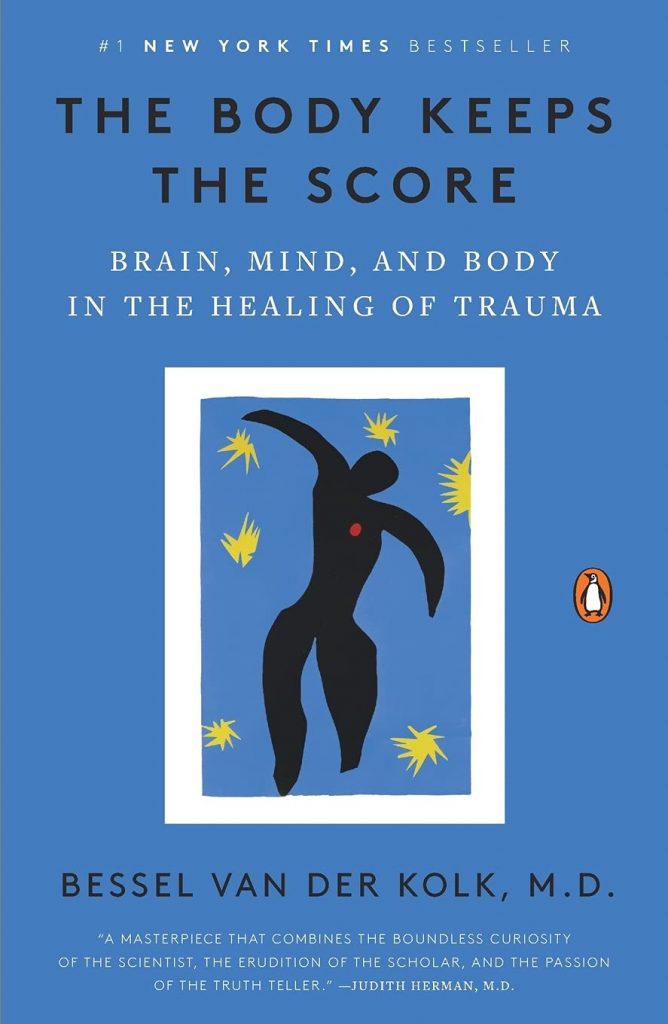I am always fascinated with our brain and the mysterious way it works. Most of us know so very little about it. Whenever I come across a book talking about the human brain, I have to pick it up. Then I just can’t put it down and get enough of it.
The very fact that I recently lost someone close to me to a brain disease makes me be even more curious about this amazing, complicated organ, which controls and rules our whole physical and mental being. Picking up the book, The Body Keeps the Score, by Bessel van der Kolk M.D., was most timely. I had meant to read this book for a while, and I finally did. I absolutely loved and was amazed by it.
I should admit that I was expecting to read about the relationship of our chronic body pain and our brain, but I was embarked upon studying a complete text book, focussing on PTSD and trauma studies based on the author’s extensive scientific research. By reading this book, what I basically learned was that our brain’s job is to protect us for survival at times when something goes drastically wrong with us or around us. It immediately sends danger signals and stress hormones to the most vulnerable of our body parts to shut them down for the means of protection, until the danger has subsided. Oh… Then, that’s why I get back pain when I am under too much stress, I tell myself. The physical pain we experience after a trauma in our lives is devastating, and I agree with the author that trauma changes the chemistry of our body, as well as changing our personality. Reading about all these painfully dramatic stories of the patients suffering mental anguish because of trauma or PTSD for the sake of the author demonstrating his point before he could get to talk about his choice of treatment for his patients made me think that there were too many stories, and it was all a bit of over sharing.
This book is not for the faint of heart! The stories of trauma are heavy and dense. Though they are informative, they are, at times, depressing. When you read them all, they are a difficult read for a lay person. This book cannot be recommended for every one. It is too long, too intense, too textbook like, and, at times, tedious. The language is quite academic. It is definitely a much easier read if you happen to be a therapist. In conclusion, I should say that in spite of all this, the book is one of the most fascinating books I have read recently. That, I admit.
About the Author
Bessel van der Kolk MD spends his career studying how children and adults adapt to traumatic experiences, and has translated emerging findings from neuroscience and attachment research to develop and study a range of treatments for traumatic stress in children and adults.
In 1984, he set up one of the first clinical/research centers in the US dedicated to study and treatment of traumatic stress in civilian populations, which has trained numerous researchers and clinicians specializing in the study and treatment of traumatic stress, and which has been continually funded to research the impact of traumatic stress and effective treatment interventions. He did the first studies on the effects of SSRIs on PTSD; was a member of the first neuroimaging team to investigate how trauma changes brain processes, and did the first research linking BPD and deliberate self-injury to trauma and neglect in early childhood.
Much of his research has focused on how trauma has a different impact at different stages of development, and that disruptions in care-giving systems have additional deleterious effects that need to be addressed for effective intervention. In order to promote a deeper understanding of the impact of childhood trauma and to foster the development and execution of effective treatment interventions, he initiated the process that led to the establishment of the National Child Traumatic Stress Network (NCTSN), a Congressionally mandated initiative that now funds approximately 150 centers specializing in developing effective treatment interventions, and implementing them in a wide array of settings, from juvenile detention centers to tribal agencies, nationwide.
https://www.besselvanderkolk.com/
He has focused on studying treatments that stabilize physiology, increase executive functioning and help traumatized individuals to feel fully alert to the present. This has included an NIMH funded study on EMDR and NCCAM funded study of yoga, and, in recent years, the study of neurofeedback to investigate whether attentional and perceptual systems (and the neural tracks responsible for them) can be altered by changing EEG patterns.
His efforts resulted in the establishment of Trauma Center (now the Trauma Research Foundation) that consisted of a well-trained clinical team specializing in the treatment of children and adults with histories of child maltreatment, that applied treatment models that are widely taught and implemented nationwide, a research lab that studied the effects of neurofeedback and MDMA on behavior, mood, and executive functioning, and numerous trainings nationwide to a variety of mental health professional, educators, parent groups, policy makers, and law enforcement personnel.
Tags: Bessel van der Kolk M.D., Bessel van der Kolk MD, Book Review, Book Reviews, Books, The Body Keeps the Score
Posted in Book Reviews, Reviews |



Leave a Reply